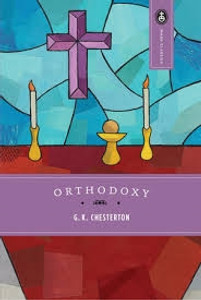Gilbert
Keith Chesterton is one of the most celebrated and reverently
esteemed figures in modern literature. He was a phenomenally prolific
writer. After achieving early success as an illustrator, he
subsequently established his fame as a playwright, novelist, poet,
literary commentator, pamphleteer, essayist, lecturer, apologist, and
editor. The depth and range of his work are astounding.
A
pagan at only 12 and totally agnostic by 16, Chesterton had the
remarkable experience of developing a personal, positive philosophy
that turned out to be orthodox Christianity. Orthodoxy, his
account of it all, has not lost its force as a timeless argument for
the simple plausibility of traditional Christianity. C.S. Lewis and
many other emerging Christian thinkers have found this book a pivotal
step in their adoption of a credible Christian faith. This
intellectual and spiritual autobiography of the leading 20th century
essayist combines simplicity with subtlety in a model apologetic that
appeals to today's generations of readers who face the same
materialism and antisupernaturalism as did the "man at war with
his times."
Of
the numerous works that Chesterton wrote, the most scintillating
synthesis of his philosophy and deeply religious faith was manifested
in his masterpiece, Orthodoxy, written
when he was only thirty-four and which tells, in his inimitable,
soaring prose, of his earth-shaking discovery that orthodoxy is the
only satisfactory answer to the perplexing riddle of the
universe. Orthodoxy is
perhaps the most outstanding example of the originality of his style
and the brilliance of his thought.
"There
has never been a more articulate champion of classic Christian
orthodoxy, virtue, and decency than this rotund jouster whose words
were his weapons About
the Author
Gilbert
Keith Chesterton (1874 1936) was an English writer, philosopher,
satirist, and social critic. During his lifetime, the prolific
Chesterton wrote eighty books, several hundred poems, some two
hundred short stories, four thousand essays, and several plays. He
was also known as a strong debater and Christian apologist. He often
took on what he considered to be the flawed philosophy of modernism
found in the writings of his good friends Oscar Wilde and George
Bernard Shaw. It was Shaw who once referred to Chesterton
in Time magazine as "a man of colossal genius."
Chesterton's writings consistently displayed wit and a sense of
humor. His ingenious use of paradox in his commentaries on the
leading political, economic, philosophical, and theological beliefs
of his day makes his writings as relevant today as they were a
century ago.
Format: Paperback Dimensions: 8 X 6 (inches) 